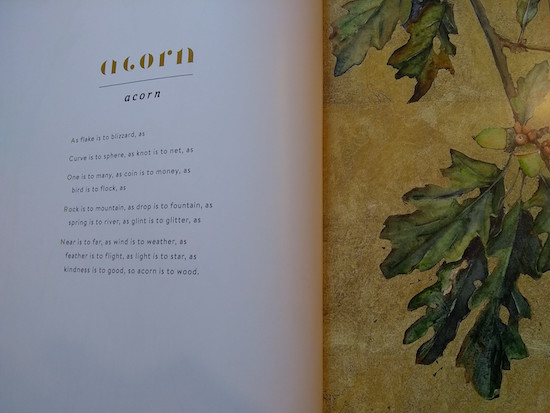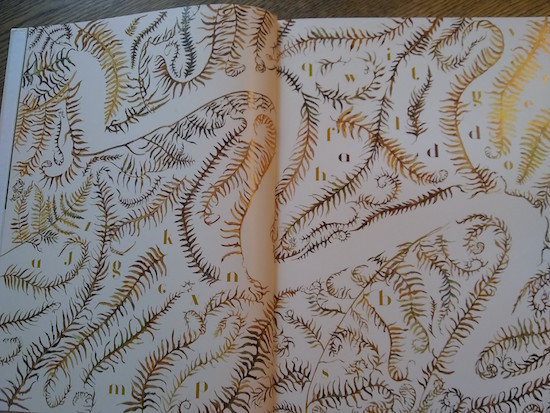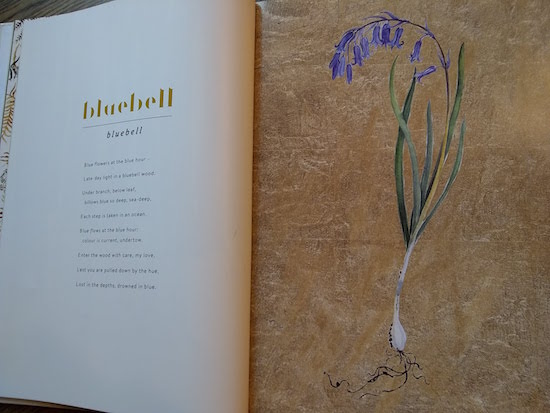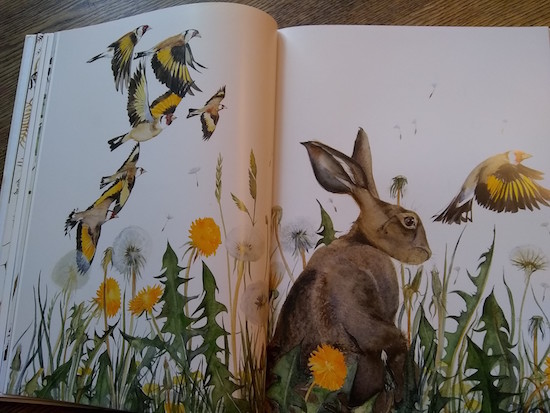February 16, 2018
(Not) Getting Paid to Do What You Love
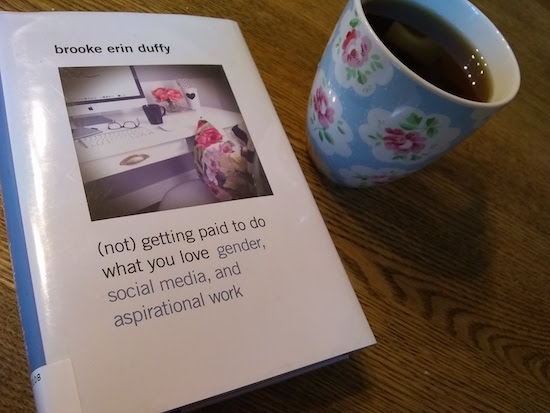
I saw the worst thing ever two days ago, which was an Instagram account where one photo included the following caption: “Happy Anniversary to my adorable hubby! I love the life we created together including our fantastic son:. #ad”. Another photo was of a bowl of soup and a link to a post about how blogging had allowed this writer to find her passion and make it her career, and that passion was for, apparently writing posts about canned soup, and there’s even a giveaway to win $500 so you can get started on following your dreams and writing about soup too. “Love what you do! Keep chasing your dreams!” chimed her commenters, who are surely part of a weird scheme of override Instagram’s algorithm, because I can’t think of any other reason so many people loved the soup post. Which didn’t even mention the soup, which is a travesty, because I love soup, and could read about soup for days.
This Instagram account seemed unreal in more ways than one, and was particularly resonant for me just one day after I’d finished reading Brooke Erin Duffy’s (Not) Getting Paid to Do What You Love: Gender, Social Media, and Aspirational Work. Loving what one does and chasing dreams were a recurring theme in Duffy’s interviews with fashion bloggers, Duffy’s thesis being that there’s a lot of chasing and you sure better love what you’re doing because you’re probably not going to get paid for it, except maybe with soup.
I heard Duffy talk about her book a few weeks ago at the McLuhan Centre’s Monday Night Seminar Series, “MsUnderstanding Media,” and it was a fantastic discussion. One that was right up my alley in lots of ways, and not, at the same time. Or at least that’s what I kept telling myself. Duffy’s ideas about aspirational labour in the fashion blogosphere not entire applicable to where I’m at in book bloggerdom, but still discomforting in a few respects and her book would end up problematizing my own work and ideas in an interesting way.
But still. There are many blogospheres, I remind myself. There are many book blogospheres, as there are many fashion blogospheres, I presume. And as I type this now, having always considered these multitudinous blogospheres a positive thing, albeit difficult to catalogue or classify, I think of the Ellen Ullman book I read a few weeks back, the essay about the internet as the opposite of democracy. Is saying, “Not my blogosphere,” I wonder, the equivalent of saying, “Not my blogosphere, not my problem?” Is relegating the entire internet to a serious of unconnected spheres—each one with a self-absorbed user at the middle—a sorry statement about the possibilities of online connection and the possibility for societal change in 2018?
I wonder. The internet is a blurry place. My friend, Dr. May Friedman, talked about this in her book, Mommyblogs and the Changing Face of Motherhood, when she wrote, “In trying to form conclusions about mommybloggers—and about mothers—I am reminded of my children attempting to jump upon their own shadows: I am attempting to trap an essentially untrappable form of knowledge.” In her book Friedman is more open to the amorphous nature of the blogosphere(s) than Duffy seems to be, open to the potential of the grey areas, to the possibilities represented by blogs being, as Duffy puts it, “murky conceptual spaces.” Although Friedman’s ideas about the radical potential of blogging were based on last decade in the blogosphere. We talked about this the other day and she suggested that perhaps the radical possibilities she’d written about had failed to become reality. So much so that Duffy’s understanding of the blog in 2018 as a hybrid space is devoid of radicalism altogether. Duffy writes, “Portmanteaus such as pro-sumption, produsage, pro-am, and playbour capture the nuanced ways in which production and consumption, work and play, and amateurism and professionalism bleed into one another in digital contexts.” Grossest hybridity ever.
In her book, Duffy is writing about our current moment, “…an era where the web’s non-commercial roots are largely forgotten, buried beneath a veritable heap of sponsored messages, native content, and cookie-tracked conversations.” Except that I haven’t forgotten those roots, roots that are blogging itself, I think. Roots I take my students to when I try to inspire them to write blogs and read blogs, real blogs instead of those pseudo-blogs that have hijacked an art form and turned it into a cheap commodity. #SoBlessed.
Realness and authenticity are indeed blogging’s roots, as Duffy writes, set in oppositional to magazines and advertisements, glossy and posed. Except that even realness been co-opted, underlined by market logic. To be authentic is to be “relatable”, but as a blogger becomes successful she becomes more difficult to relate to and her authenticity becomes a pose. Further, “…for many aspirants, individual expressions get refracted through considerations of audiences; one’s creative voice is synonymous with her commoditized brand…. Authenticity, thus, becomes a means to an end—namely drawing readers and potential advertisers.”
Which is why I tell students to “Blog like no one is reading.” Clever because, for most of us, often no one is. Those superstar bloggers who’ve been able to quit their day jobs and live off the fruits of their leisure/labour/soup are clearly exceptions to the rule. These bloggers have won what Duffy references, via Andrew Ross, as “the jackpot economy.” For the rest of us, we’re going to get paid a pittance, if anything, and this is Duffy’s complaint with the soup we’re being sold, “the dubious reward structures for aspirational labour.” The idea of a “partnership” between a huge corporation and a twenty-three year old woman with a Bachelors degree working out of her bedroom. How calling it a partnership makes it almost seem like fairness, which is another way the labour of blogging is rendered invisible.
And the labour is only intensified by the need to have it all seem so effortless. The work must necessarily be concealed. “I just happened to be doing a yoga pose halfway up a tree,” says the Instagrammer. Except: you had to climb the tree, someone had to take the photo, someone had to buy the camera, fix your dress so that your underwear wasn’t showing… “Their shots are often cannily staged to ensure a particular aesthetic—one that cloaks the staging itself.” And the statistics are likely that you’re never going to make it to the upper echelons, so what’s the point of all this work? (Me: If blogging is a lot of work, you’re doing it wrong. The point of the blog is to be raw, and unpolished. Immediate.)
Immediacy is the opposite of aspirational, which was what I kept telling myself as I read Duffy’s book about the problem of aspirational labour. Instead of aspiring, I urge the writers in my blogging classes to focus on the immediate. Blogging is about capturing a moment, writing right now. Which is why I don’t do scheduled posts. Which is why I take holidays a few times a year, weeks away from my blog, because it’s good to have a break and also because it reminds readers that there’s an actual human writing here. Which is the reason I’ve been able to maintain my blog for more than 17 years and not expire from burnout. We don’t use our blogs to get to some place better, but instead to be present in the current moment, a moment that becomes obsolete in thirty seconds. To try and fail to capture some of the atoms as they fall.
(Blogging is very much about failure. Imperfection. It’s a project that will never be finished. It’s about typos and weird formatting, and things that seemed like revelation a decade ago that these days make you want to die when you read it. So you don’t. Archives are only nice in theory. But even still, to wish to banish your archive [although you don’t] only means that you have grown, learned, and a blog is a document of that process. Your blog, like your life, is a work in progress.)
But am I an aspirational blogger? Have I been one? I wonder this. When I started blogging in 2000, I definitely wasn’t, because there was no template for blogs as a path to anywhere. I was just glad to have a place where I could write things, and people might read them. I had a voice. It seemed like a powerful thing, and not the opposite of democracy. Around 2004/2005, I was reading a lot of book bloggers, and aspiring to have a blog like that, I suppose—but that I aspired to have a blog like that is not the same as being an aspirational blogger. (Also, at the time I did not have a book blog.) By 2005 I was in graduate school, and did a project on “blooks” (whose title was, “Oh no! Not Another Portmanteau!”). So by this point, I knew that blogs could be a path to somewhere, but I don’t think I ever thought about being on that path. I was blogging for the same reason I’d been blogging since 2000, which was to make sense of things, for posterity, to ask questions. My blog turned into a book blog because my life had turned into a book life, and that’s the way it goes.
In 2007, a publisher offered to send me books. This was the first time I remember feeling vaguely aspirational. I felt legitimized, recognized, more than “just a blogger.” Was I selling out, I wondered? For about five minutes, but I said yes because I wanted books. And I thought about this too as I read Duffy’s book: are books “product”? Is me receiving books from publishers different from fashion bloggers receiving items for promotion? Maybe, maybe not. I’m thinking towards the latter because I don’t see it as my job to market books. I review a small fraction of the books I’m sent for review. I also obtain books by other means: I buy them, I borrow them from the library. And the people who read my reviews can borrow them from the library too. It’s not all necessarily driven by “market logic.” But when I was listening to Duffy speak, she gave the example of bloggers who make a big deal out of having purchased certain items—as though partaking in capitalism was a more legitimate way to appreciate something. And I do this too, I realize, making a big deal out of the books I buy “with my own money”.
Why I am I photographing my book hauls? Telling you about the bookshops I bought them at? Again, with books, I suppose it is different, and bookshops too—books are culture, the shops are cultural centres. There is an argument to be made that this is distinct from me writing a post about the new boots I bought at Nordstroms. Except that I do frequently write posts about buying things that aren’t books—I love photographing my brunch at cool restaurants I visit. I love tagging locals shops and designers when I’m wearing their clothes. When we got our new couch last month, I was all over Instagram because my couch had its own personal hashtag and I thought the brand was cool, and I was a bit cooler because of proximity. Social media had allowed me to feel connected to these brands, to feel like there was a relationship—which is kind of weird, and Duffy writes about the strangeness of your friends being brands, and brands being your friends.
That I am purchasing items and services from these brands underlines my authenticity though, or so it seems. (Even though I also want you to think I am cool because I have a mid-century modern sofa, for example.) Demands for “purity” means real (or “real”) bloggers don’t do it for the money or sponsorships. Getting paid is selling out. Although isn’t it only fair to want to be compensated for one’s labour? Should we necessarily denigrate someone for wanting to get paid for doing what they love? (Except, of course, one rarely does. One gets paid to write stupid posts about soup.) We turn down our noses at aspirational bloggers. Which means that everyone has to tell the same story about how they became a successful blogger but by accident.
So much of this is gendered. Women aren’t supposed to be aspiring. Also, the “partnering” and the promoting of brands they love is a gendered form of labour with a long history. Women are “social.” Do women face more struggle for trying to get fair compensation for their work? In general, yes. Is shitting on bloggers for “selling out” part of that same pattern? It’s more difficult for women bloggers, I think, because they must necessarily invest their personality in the work they do. (We make fun of self-branding, but also expect women bloggers to give of themselves.) And so the balance is harder, and the terribleness is obvious when the balance is lost—see the soup post, and the Happy Anniversary #Ad. “Authentic” and “real” are terms that get thrown around, but I think that most of us still turn to blogs for the human voice, which has been the appeal from the very start. And when the blogger is writing about things she doesn’t actually care about, the whole point of the endeavour is lost.
I don’t think that blogs can be successful commercial endeavours. There are a few exceptions to the rule—I can thing of a single blogger whose sponsored posts I ever read and shared—but in general, if you want to make money, you should do something that isn’t blogging. Which is why I insist that my students that they should get a pay-off from their blogs in other ways (that are not soup): my blog taught me to write book reviews, to engage deeper with the books I was reading. My blog was useful to me; it still is. And not just because I use it in lieu of possessing a short-term memory. These days I am challenging myself to write a post like a column once a week. I’m still learning from my blog, still growing because of it. My blog serves me, and not the other way around. (See my previous paragraph about blogs being raw and unpolished. About taking holidays). I get around the idea of blogs being unpaid labour by insisting that they shouldn’t take up that much of your time. A lot of professional writers, academics in particular, struggle with this, imagining that ever post demands hours of research, references. Or, I suppose, the labour I wrote about above with the woman doing yoga up the tree—and add to that obligations to promote that post via a lot of social media platforms. If you’re doing that much work and not getting paid for it, it’s not the blog’s fault, it’s your fault.
“But aspirational labour has succeeded in one important way; it has glamourized work just when it is becoming more labour intensive, individualized and precarious,” writes Duffy. I am older than a lot of her interview subjects. I have been blogging for almost half my life, and blogging fits into my life by now as easily as reading does, as breathing does. I am fortunate that my blog has delivered me to a writing career, even though I didn’t see it as a tool for that exactly. I mean, I always wanted to be a writer, and my blog was just a place to exercise, to practice. When I finished my Masters degree and failed to publish my novel, I saw my blog as consolation instead of a launching pad; a place to write that was mine, and where in my moment of failure I could still be creative. Creating. Another thing though: I have a husband with a full-time job and health benefits. If I didn’t have children I would be able to work more and earn more money; but if I didn’t have a husband with a full-time job and health benefits my lifestyle would be severely compromised. I’d be taking photos of fewer stylish desserts on Instagram, is what I’m saying.
But still, it’s easy for me to say that, “Blogging should be easy,” when I’ve got a brand, like it or not, and an audience, a platform. If I was young and just getting started, the rules I play by might no longer apply. Although I like to think that they do. Yes, if you play by them you’re unlikely to hit the professional jackpot, but blogs are inherently marginal and obscure. “Well-known blogger” is an oxymoron, remember? But if you blog by my rules you won’t get stuck doing yoga halfway up a tree. Self-expression won’t become linked to marketability. You will be blogging like no one’s reading, and figuring out what you really mean, learning what your voice sounds like, what you think, and what you have to say. And you might be aspiring, yes, but isn’t everybody? Aspiring to get to the next work, the next sentence. Everybody who writes anything is aspiring to be read.
February 12, 2018
So there is light
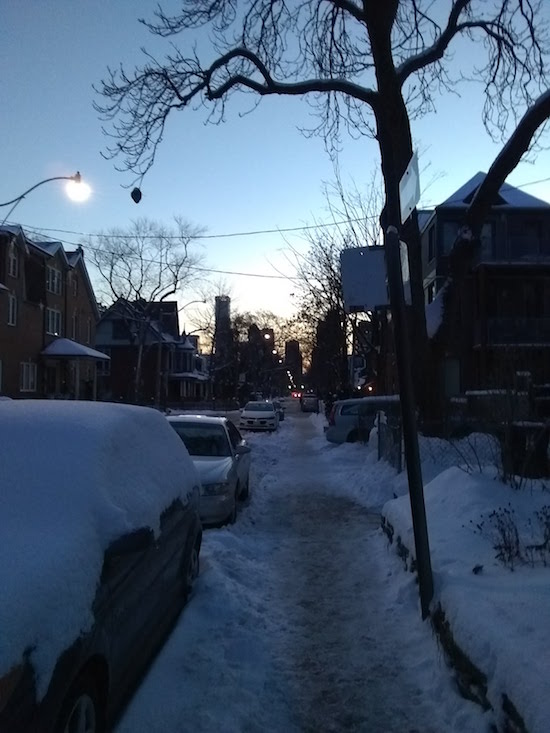
So there is light, literally, if not metaphorically. When I headed to the pool at 7am today, the sky was blue for the first time in months, and never mind that I had to crunch through snow and slide on ice to get there, it was undeniable that the sun is returning. Which can even be true even as we spent part of Saturday afternoon standing in a snowstorm at a vigil for Colten Boushie, a young Indigenous man who was shot in the head by a man who has been acquitted by an all-white jury of any responsibility for his death. Even as Canadians pile on the racist hate in online comments (and in the world) and pitch in to crowd-fund for Boushie’s killer and his family. As a white settler in Canada, there is so much to reconcile, and the work is ours, but I am inspired by the people who are doing it and I’m aspiring to be one of them. So there is light there too, as so many of us wake up and stand up and proclaim that justice wasn’t done here. Which is a thing I’m finding I’m proclaiming a lot.
Although I’ve been proclaiming a lot of things a lot, usually with a snarly look on my face. It is February, and it has been such a February, since mid-January, really. And while I don’t mind the fact that we’ve had a real winter to contend with—lots of snow and cold and ice, but what else is winter for?—I am always my very worst self around this time of year, when it’s still so dark and it’s been dark for awhile. I catch myself in a moment and wonder what’s happened to me, why I’ve become such an irritable crank, and then I remember that it’s February. My best self starts to bloom along with the crocuses, which are still weeks off yet, but still. There was light this morning, and we’ve made it to mid-February this week, which is a week I’ve loved ever since they put a long weekend in the midst of it, plus Pancake Day AND Valentines—how can a single week hold so much goodness? In just two weeks we’re going to be in England for a spring sneak preview, where the grass is green and flowers are blooming, and people will complain about the weather but we’ll just roll our eyes at them. And when we come back it won’t even be February anymore.
February 9, 2018
Author’s Day, by Daniel Pinkwater
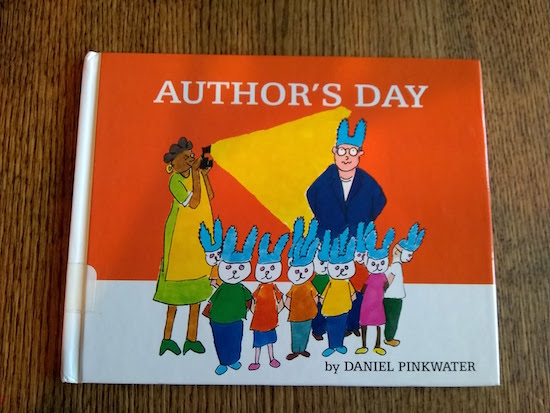
Being an author always seems like it might be a little bit glamorous, which I know because I spent a large part of my life wanting to be one. Back in the days before I knew that your favourite author “spending an afternoon signing” at a big box bookstore really means she’s sitting lonely at a table, trying to coerce strangers into purchasing her book via fledgling sales and marketing techniques, unless she was JK Rowling, which she usually wasn’t. I have never spent an afternoon signing books at Indigo, mostly because I do not overestimate my own popularity and also I read that essay years ago by Margaret Atwood about signing her book in the socks department at Eatons. My first experience of encountering my novel in a bookstore only underlined to me that being an author is an exercise in mild humiliation. I’m still pretty raw about the reading I did in 2014 that nobody came to. Although I felt better after I did an event with a wildly successful author not long ago who gave me a dirty look when I suggested that all her events were well-attended—maybe the problem wasn’t just me. And also after I read Billie Livingston’s beautiful essay about a US book tour event gone wrong that ended up going oh so right. About “the spark that connects far-flung strangers,” which is why we write at all really, and the great privilege of putting a book into the world.
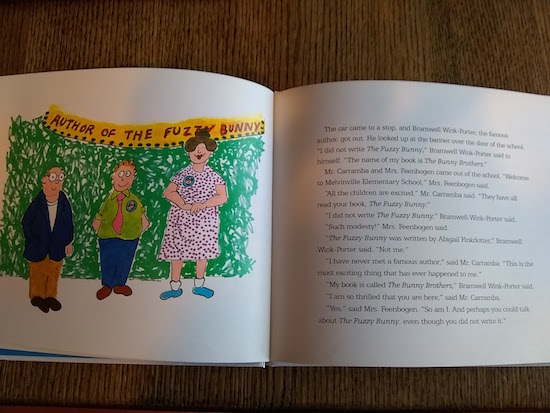
I don’t know if I ever thought that being a children’s author might be a less humiliating experience than publishing novels for adults, but Daniel Pinkwater’s book Author’s Day suggests that it isn’t. I also don’t really know how Pinkwater managed to publish Author’s Day, unless maybe he’d given some publishing executive’s toddler the Heimlich Maneuver and the book was payback for the favour. Because, from a child’s eye view, Author’s Day is not particularly appealing. It’s a picture book with two-page text-only spreads. The story itself is passive-aggressive as all get-out, angry, mean and completely self-serving—and I love it. My children find it weird and a little bit funny, but I think it’s brilliant. I found it in the library about a year ago, and then absolutely had to have a copy of my own, which I was able to purchase on Amazon for a penny.
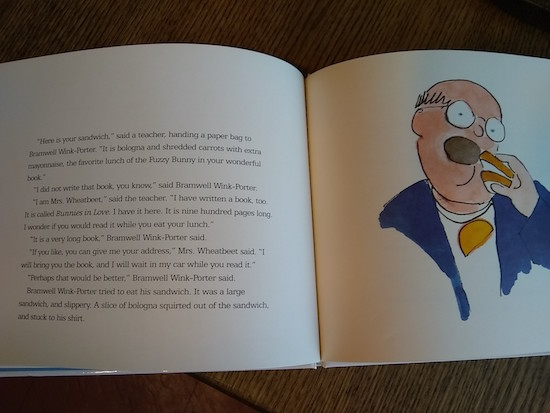
The plot is this: it’s Author’s Day. A banner is hung. Everybody at the school is very excited about the visit of Bramwell Wink-Porter, author of The Fuzzy Bunny. Except, “I did not write The Fuzzy Bunny,” says Bramwell Wink-Porter to himself when he reads the banner. “The name of my book is The Bunny Brothers.” When he informs the principal, Mrs. Feenbogen, she suggests, “[P]erhaps you can talk about The Fuzzy Bunny, even though you did not write it.” In the school library, there is a box of books for Bramwell Wink-Porter to sign, and the books in that box are Bunnies for Breakfast, written by Lemuel Crankstarter. But before anything can be sorted out, Wink-Porter is dragged off to the kindergarten where numerous sticky children insist on hugging him and feeding him pancakes with pieces of crayons in them. And then he arrives in Grade One, where the children have dressed up in Fuzzy Bunny Masks and Fuzzy Bunny hats. They ask him questions like, “Was it hard to write The Fuzzy Bunny?” And then he goes to the staff room, where a teacher gives him a sandwich that was the favourite sandwich of the fuzzy bunny in The Fuzzy Bunny.
“I did not write that book, you know, said Bramwell Wink-Porter.
“I am Mrs. Wheatbeet,” said the teacher. “I have written a book too. It is called Bunnies in Love. I have it here. It is nine hundred pages long. I wonder if you would read it while you eat your lunch… If you like, you can give me your address… I will bring you the book and I will wait in the car while you read it.”
…Another teacher sat down. “I am Mrs. Heatseat. I think it is wrong that animals do not wear clothes. I know you agree with me, because the Fuzzy Bunny always wears a raincoat.”
The fourth and fifth graders give him drawings of the Fuzzy Bunny on large sheets of paper with coloured chalk that gets all over his clothes. They let him pet their class bunny, who bites Bramwell Wink-Porter on the thumb. And then he goes to the sixth grade.
The sixth graders were waiting in the library. “Hey, doofus!” one of the sixth graders shouted. “You’ve got a slice of bologna stuck to your shirt, and there is coloured chalk all over your clothes!”
They end up tying Bramwell Wink-Porter to a chair.
And suddenly I feel better about everything, and very much not alone.
February 7, 2018
Instagram Like a Mother
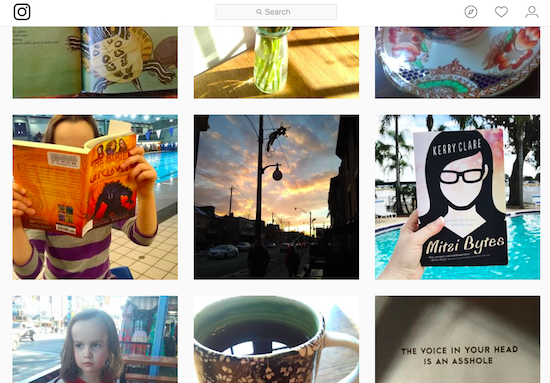
On Sunday morning I knew my panel would be on the second hour of The Sunday Edition, so I was listening when I heard Michael Enright say, “And coming up next we have three smart and funny young women…” And, oh there we are!, I thought, speaking aloud to wonder why he’d be calling us young when our collective age divided by three was at least forty. And then by the time I’d finished my sentence, Enright had already intro’d the segment, which was about Instagram and featuring three guests who were each twenty. Another panel. And I was kind of mortified, because the distance between the person you are in your mind (“a smart, funny young woman”) and how the world actually sees you is something usually best kept to oneself.
As I listened to the segment though, I started to be grateful for that distance, for how far away I am from being twenty-years-old. Because while I think of myself as essentially twenty, give or take a decade, and also more than obsessed with Instagram, that I live in the virtual world differently from these women became quite obvious. We might as well have been on different platforms altogether. They talked about their experiences of taking photos, tens and tens of photos, evaluating the angle of their nose, skin tones, and then the next step in the process is sending these photos to a whole bunch of friends to find out which ones should be posted. And the photos that make the grade are posted—but if they don’t receive the requisite number of likes in a moderate period of time, the photos will be deleted. A failure of nose angle, skin tone, and personal brand.
“That sounds like the worst thing ever,” I thought, listening to the women speak. It’s like they took the essence of being twenty—coming up with a tentative self and testing the waters, putting your face in the world and asking, “Could you like me? Could you like me?”—and made it concrete with an app. When for me, Instagram is all about colour, and wonder, and noticing things. It’s about paying attention, and marking a moment, and no matter how mundane my pursuit or photograph, there’s bound to be at least five people in my community who “like” it and they each give me such a boost. It’s about marking days and moments, seeing the ceremony in ordinary things. And even selfies, much maligned, have made me grow accustomed to and even fond of the way my face looks. I didn’t used to feel like that. Part of it was that I used to be twenty, which is a hard age to have self-esteem at, even with unlined skin and just one chin, which I never appreciated properly at the time, but also Instagram and selfies have helped to decrease the distance between the person I am in my mind and how the world sees me (even if I still overestimate my perception as ‘funny and young’). Instagram and selfies have helped me get to know me better.
“I should teach these women how to Instagram,” I was telling my husband later, the same way I teach people in my blogging courses. To make peace with imperfections, to use the aspirational side of online life to aspire to good things, to use blogging/social media as a space to wander, to grow, to get lost in. To turn the lens outward, and develop your eye as well as your I. “How to Instagram like a Mom,” is what I’d call it, and seeing as twenty-year-old women these days have a penchant for mom jeans, maybe it might even catch on.
“Or you could call it, ‘How to Instagram in a Way That Doesn’t Make You Want to Die,'” said Stuart, “since that’s what you’re selling.”
“Except they’re twenty,” I remembered. “If they had to make the choice between being like me or dying, they would probably choose the latter.”
Because even though it’s been awhile, I remember that about twenty too.
February 6, 2018
Neat Things: A Round-Up

Hands down, the best thing to happen to me last week was my conversation with writers Elizabeth Renzetti and Nicole Blades, and broadcaster Michael Enright, on CBC’s The Sunday Edition. Apart from the excitement of actually being on a show I listen to every week, the conversation itself was such a pleasure to take part in, so much fun and really interesting. You can listen again to it here.
Another wonderful thing is Anne Logan’s kind and generous review of Mitzi Bytes—that the book continues to resonate with readers thrills me to no end. She calls it a thought-provoking novel that goes beyond the limits of Mommy-Lit, and declares it one of the best books she’s read in awhile.
And finally, I loved my friend Suzanne Alyssa Andrew’s piece on owning her power and pulling a winning story from a magazine whose editor she didn’t want to be associated with in light of a sexual misconduct scandal and rabid douchebaggery. When I got to the part in which she quoted me, my head exploded—it means so much to me to know the things I write can empower and inspire others. In fact, I find it empowering and inspiring, even…
February 5, 2018
Things To Do When It’s Raining, by Marissa Stapley
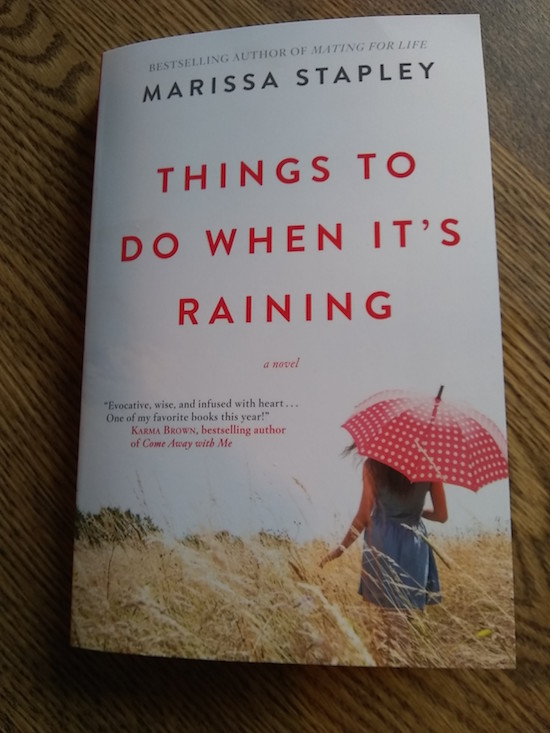
I didn’t know Marissa Stapley when I read her debut novel Mating For Love four years ago, and loved its bookishness, intelligence, and what a pleasure it was to read it. In the years since I’ve come to admire her criticism, her championing of commercial fiction and its writers, and her feminist take on the CanLit community. And I’ve also come to benefit from her community directly, with her support of my own book when it came out last year, and with her friendship. Which means that I’ve been especially looking forward to her second book, Things to Do When It’s Raining, and I’m thrilled that it’s finally here. I read an advanced copy back in January, and I devoured it in a day.
It begins with Mae Summers, whose fiancé has just disappeared along with all of the money people had invested in their business, and who turns out not to be who he said he was. Her life in pieces, Mae decides to go home again, back to the inn in the 1000 Islands where she was raised by her grandparents after her mother’s tragic death. But all is not well at home either—a secret hidden in Mae’s grandparents’ past has returned to the surface and disturbed their relationship, plus Mae’s old flame and first love is back in town, right at the moment when she’s most raw and shaken.
Obviously, with a set-up this riddled with landmines, this is going to be a book with twists and turns, plus an impromptu journey to Niagara Falls. The plot had me fixed, but I was especially in love with Marissa’s prose, her words and sentences, not to mention the amount of wisdom contained within. About life, and about love—this is a story that’s so rich. The advanced copy I read in January didn’t come with the reader’s guide contained in the final book, in which Marissa explains that the story was inspired by one in her own family history, but when I read this it illuminated the story for me, its meaningfulness and resonance. Although part of it too was that it’s also written by a wonderful writer. And I particularly loved the book’s structure, the chapters moving between different characters’ points of view, but each one preceded by an item from the list that gives the novel its title. “Things to do when it’s raining,” written by Mae’s late mother in her youth, so that her voice infuses the novel like the presence of a ghost, so that we know full well what the other characters are missing. And the subtle ways these items tie into each chapter: “Build something. There are tools and scrap wood in the shed. And yes, bandages and ice in the kitchen, in case you accidentally hammer your finger.”
I received a finished copy of Things to Do When It’s Raining, but I’m fully intending to buy one too, which means I’ve an extra now for giveaway. Leave a comment on this post and let me know your favourite thing to do when it’s raining, and I will randomly choose a winner. Canadians only please, for postal reasons. And happy book birthday, Marissa!
UPDATE: Thanks for the comments, everyone! The winner has been chosen via Random Number Generator (i.e. very scientific…)
January 31, 2018
14 Seriously Underrated Reasons to Marry Somebody
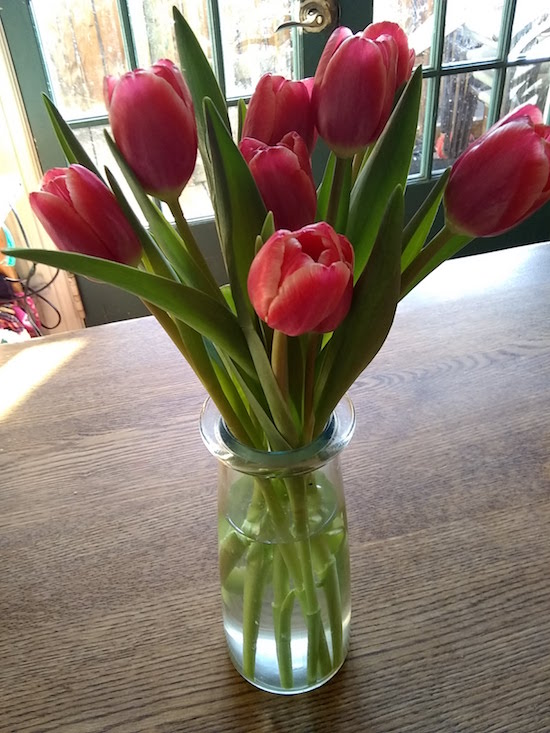
- They make excellent sandwiches.
- They don’t snore.
- They are happy to lend you the ‘u’ from their Scrabble tiles so that you can spell “wondrous.”
- They always share their snacks.
- They remember where you left your hairbrush.
- They buy you new shoes when you decide to start jogging. When you quit jogging three weeks later, they never say a word.
- They don’t hold your bad taste in pop music against you, and even dance in the kitchen.
- They know how to build websites.
- They send you texts after you finish doing something new and exciting asking, “How did it go?”
- They go to the gym but don’t talk about it or make you come.
- They will go to the bookstore for you. They will also come to the bookstore with you.
- They are as good at navigating as you are at driving.
- They are good at back rubs.
- They put the kettle on before you’ve even asked.
January 30, 2018
Boat People, by Sharon Bala
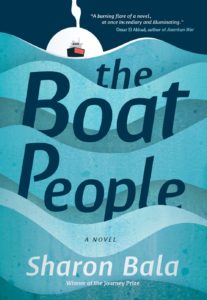 The debut novel by Sharon Bala (who was acclaimed for her short fiction with the award of The Journey Prize last year) is The Boat People, an ambitious, engrossing and absolutely important book that I keep hearing about everywhere—Bala was on The Sunday Edition; reviewed in The Globe & Mail—and for good reason. It’s a book that might be called timely, except that stories like this—of people fleeing war and persecution, chancing everything on survival in a new land, being viewed with suspicion upon arrival, the threat of outsiders and others being manipulated for government propaganda—are as old as stories about people venturing across seas at great peril in search of a better life are. Which is to say: as old as stories themselves. And peoples, and seas.
The debut novel by Sharon Bala (who was acclaimed for her short fiction with the award of The Journey Prize last year) is The Boat People, an ambitious, engrossing and absolutely important book that I keep hearing about everywhere—Bala was on The Sunday Edition; reviewed in The Globe & Mail—and for good reason. It’s a book that might be called timely, except that stories like this—of people fleeing war and persecution, chancing everything on survival in a new land, being viewed with suspicion upon arrival, the threat of outsiders and others being manipulated for government propaganda—are as old as stories about people venturing across seas at great peril in search of a better life are. Which is to say: as old as stories themselves. And peoples, and seas.
Inspired by the 2010 story of a ship of Tamil asylum-seekers arriving in British Columbia, Bala’s story begins with Mahindan, a Tamil mechanic who has lost everything except his young son and has bet everything he has on the chances of finding a new start in Canada. The novel begins with the ship’s interception as it reaches Canada, and follows Mahindan through the process of being imprisoned and separated from his son as months go by and his fate is left in limbo—will he get to stay in Canada, or will be he deported to Sri Lanka where nothing good awaits him. Alternate chapters also take us back through his history, showing us how he went from a happily married man with family, friends and a rich life, awaiting the birth of his first child, to someone with (almost—save for his son) nothing left to lose—the gradual reveal of Mahindan’s backstory makes for compelling, powerful reading.
But Mahindan is not the story’s centre, or not its only one; that this is a story with multiple centres and voices and points of view is an important aspect of its construction. Because there’s never just one centre of a story, and all the best narratives refuse to be contained, overflowing to be resonant in all kinds of surprising ways and flowing into other stories. Like the story of Priya, a second-generation Tamil-Canadian who would just like to finish her placement in corporate law so she can become accredited and begin work in mergers and acquisitions, thank you very much. But the fact of her ethnicity means she’s roped into a position with another lawyer in the company who’s working in refugee law and who overestimates her knowledge in terms of Tamil language and culture to assist him as he supports the Tamil asylum seekers with their refugee claims. Like Mahindan, Priya is somewhere she doesn’t belong, and for a while she resists being involved with the asylum seekers and the war her parents had been so intent on leaving behind them when they arrived in Canada. But eventually, she becomes invested, and the ramifications of this are felt deep within her family.
Like Priya, the story’s third central character has also worked to put the past behind her, a third generation Japanese Canadian called Grace whose hard work in the civil service has been rewarded with a role adjudicating refugee claimants. She begins her new position not long after the Tamils arrive, and political tensions are high, and ever being manipulated by Grace’s former boss and mentor, the Federal Minister for Public Safety whose interests lie in keeping the threat of terrorism high. Meanwhile, Grace’s mother is ailing from Alzheimers and the past and the presents are intermingling in her head, stirring stories of the internment of Japanese-Canadians during World War Two, stories that Grace’s family had been careful never to dwell on. Stories of othering, persecution, public safety threats, racism, and so much terrible history that’s so analogous to what’s going on in the present day.
Bala’s prose is beautiful, the narrative so careful woven, and the shape of the novel itself so terrifically undefined in a way that allows the story to go beyond its limits, to pose questions that don’t necessarily have answers, to unsettle its readers in the most powerful way. There is a didacticism at work, but with a depth and complexity that saves the novel from its few too-earnest moments. Further, a little earnestness is nothing to scoff at, and maybe the author of a book this interesting, original and well-written has earned those moments. Especially since this is such an essential book for Canadians to be reading right now.
January 29, 2018
Encyclopedia of An Ordinary Life
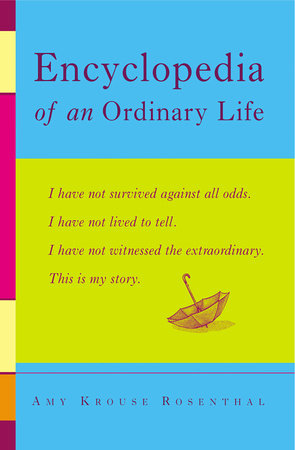 I got Amy Krouse Rosenthal’s Encyclopedia of an Ordinary Life out of the library on Friday and devoured it in two days while annoying everybody in my presence because I’d insist on reading passages aloud while they were trying to play Pokemon or read a different book or conduct a conversation. I loved this book so much, for all kinds of reasons, which weren’t necessarily the reasons its author intended the book to be loved when she published it for the first time in 2004. Except for this one: that she’d intended the book as a document of ordinary life at the beginning of the twenty-first century, and at this it succeeds so wildly, but so much so because life in 2004 seems very far away from 2018, where I read this book now. Answering machines, compact discs, and faxes. There is an image of a Yahoo email message, and I’d forgotten what those looked like—the font, the logo, the peculiar line breaks. The internet exists, but you’re not carrying it in your pocket, your purse. It’s still rife with possibilities for human connection, old friends getting in touch, hearing from strangers. The internet in 2004 was bringing us closer together instead of driving us further apart.
I got Amy Krouse Rosenthal’s Encyclopedia of an Ordinary Life out of the library on Friday and devoured it in two days while annoying everybody in my presence because I’d insist on reading passages aloud while they were trying to play Pokemon or read a different book or conduct a conversation. I loved this book so much, for all kinds of reasons, which weren’t necessarily the reasons its author intended the book to be loved when she published it for the first time in 2004. Except for this one: that she’d intended the book as a document of ordinary life at the beginning of the twenty-first century, and at this it succeeds so wildly, but so much so because life in 2004 seems very far away from 2018, where I read this book now. Answering machines, compact discs, and faxes. There is an image of a Yahoo email message, and I’d forgotten what those looked like—the font, the logo, the peculiar line breaks. The internet exists, but you’re not carrying it in your pocket, your purse. It’s still rife with possibilities for human connection, old friends getting in touch, hearing from strangers. The internet in 2004 was bringing us closer together instead of driving us further apart.
This book had absolutely nothing in common with Ellen Ullman’s Life in Code, which I finished reading a week ago, except that both had me thinking about the internet’s early days and all that possibility for connection. Rosenthal’s book reminded me of how exciting it was to be on the internet in 2004, the access to offered to worlds I didn’t know existed. The first job I had with an internet connection was at the Financial Post during the summer of 2001, which was the same summer I discovered that there was this fantastic literary culture happening in the world right now—that was the summer I bought White Teeth and A Heartbreaking Work of Staggering Genius. 2004 was when I was living in Japan and avidly reading Maud Newton and other book bloggers, and while actually becoming a book blogger still seemed like it was beyond me, living in a world where I had this window onto people doing and thinking and being literary culture was really astounding and transformative to me.
And Amy Krouse Rosenthal’s book gave me that same frisson of inspiration—these glimpses of fascinating people doing cool things. Or even mundane things, which this book is more about, the very point of it. The mundanity of the 2004 internet is also something I missed, as opposed to the YOU WON’T BELIEVE WHAT HAPPENED NEXT… clickbait. Smart people being boring, was the theme of the internet in 2004, or at least the corners of it I frequented. And it’s how I fell in love with blogging, really. The way that smart people being boring illuminated the secret wondrous corners of everyday existence, its various miracles the dancing dust motes (were dust motes actually things that people noticed who weren’t characters in novels).
She also writes a lot about death, which would not be so noticeable were she now, in 2018, not actually dead. It makes this ordinary book much more poignant, extraordinary, necessary, a gift. (See my 2015 post about blogs as “survival gear for our stories.”)
“I shopped for groceries. I stubbed my toe. I danced at a party in college and my dress spun around. I hugged my mother and my father and hoped they would never die. I pulled change from my pocket. I wrote my name with my finger on the cold fogged-up window. I used a dictionary. I had babies. I smelled someone barbecuing down the street. I cried to exhaustion. I got the hiccups. I grew breasts. I counted the tiles in my shower. I hoped something would happen. I had my blood pressure taken. I wrapped my leg around my husband’s leg in bed. I was rude when I shouldn’t have been. I watched the cellist’s bow go up and down, and adored the music he made. I picked at a scab. I wished I was older. I wished I was younger. I loved my children. I loved mayonnaise. I sucked my thumb. I chewed on a blade of grass.
I was here, you see. I was.”
January 26, 2018
Picture Book Friday: The Lost Words

A bit of magic was delivered to our house this week with the arrival of The Lost Words, by Robert MacFarlane and Jackie Morris, which I first learned about via MacFarlane’s essay in The Guardian about how British children are losing the words to describe their country’s natural places. The Lost Words is a book about absence and things that are missing, this theme reflected in the title fonts with their missing pieces, and the two-page spreads in which an absence is shown by white space. The missing thing from each spread is shown on the next page in full colour illustration with an acrostic poem on the facing page, which sounds like the worst idea ever, but these poems are wonderful. “Rustle of grass, sudden susurrus, what/ the eye misses:/ For adder is as adder hisses.” And not poems, even, according to MacFarlane, but spells. “You hold in your hands a spell book for conjuring back these lost words,” he writes in a brief introduction. “To read it you will need to seek, find and speak.” And magic indeed are what these spells are—the one about the conker is absolutely perfect, about how it’s an object so magnificent (and isn’t it?) that it could not be manufactured. “…conker cannot be made,/ however you ask it, whatever word or tool you use,/ regardless of decree, Only one thing can conjure/ conker—and that thing is a tree.”
